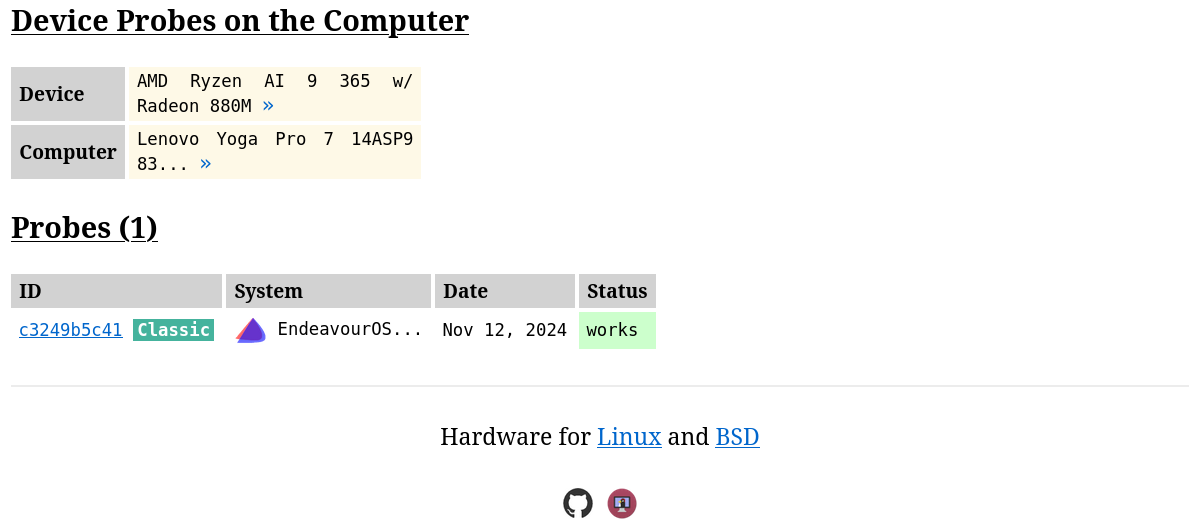cross-posted from: https://lemmings.world/post/17468408
I am thinking of buying a relatively cheap laptop that is reasonably powerful. I am at loss when it comes to new CPU naming and its compatibility with Linux (from both Intel/AMD). I prefer Ryzen 5 or Core 5 above with atleast 16GB RAM.
Framework laptops are not available where I live.
I saw some Reddit posts claiming AMD being not optimized for Linux particularly for arch related distros (I use EndeavourOS). I am thinking of buying a Thinkbook from Lenovo, but confused b/w team blue & red.
Which of these CPUs are better for running Linux long-term with respect to optimizations, power management, thermals, track pad support etc. If anyone has a laptop recommendation, please feel free to comment down below.
Also, should I go for a high end Laptop like Asus Zenbook S14? A lot of reviews are picking it as the best compact laptop to buy this year. Its expensive. But if it keeps working for a long time, like 6+ years, then I don’t mind investing.
Edit: I use Gnome as my DE with EndeavourOS, but can also try Debian 12 with Gnome.
An new AMD Laptop APU will outperform Intel in every metric. I can only recommend T14 & T14S but any other Thinkpad will be ok.
There is one metric where Intel is better and that’s Thunderbolt. You typically get more full-featured Thunderbolt ports with an Intel CPU. Of course whether that point is relevant is highly dependent on your use case.
Well for a gamer no real comment. But there is one metric Intel still trashes AMD in for the APU. Hardware video acceleration/encoding. The quality is objectively better on Intel Quicksync.
When getting a home box that also needed to do transcoding, Intel CPU was a requirement. My desktop development/gaming system? Ryzen + NVidia.
what about energy efficiency? that used to be a massive disadvantage of the amds
I think it is the reverse these days. AMD generally has better power efficiency than Intel.
This also has big implications in the desktop space. A Ryzen 7 9700x has a 65 watt TDP. A modern 8-core desktop CPU so power efficient that air cooling is perfectly fine.
Air cooling has always been fine.
good luck with a 7950x under full load
What do you think cools the fluid? Air.
There are plenty of great air coolers that can keep up. Most of the AIO coolers can’t keep up with the best air options.
If you’re looking to OC and squeeze out a negligible amount of performance, then a custom loop would be alright, but it’s never been an absolute must to liquid cool any desktop grade processor.
Last two laptops over bought for family have been AMD. They’ve been brilliant.
IMHO Intel has eroded the last scrap of trust I had in them with the 14900K crap.
Prior to that was Intel’s refusal to release Vulcan support for an older generation of iGPU to compel upgrades to newer CPU’s (by buying an entire new laptop). So I did, an AMD one.
If you need a cheap laptop, better buy a used one than new. My ThinkPad t480 is still running perfectly fine, you just can’t play games on it.
How cheap is cheap? Truly low-end laptops will generally be worse value than buying used, and low end laptops tend to suffer on some of the more subtle quality of life features with poor-quality screens, cheap trackpads, small batteries, and plastic build quality.
I do not know what others think, but in my experience Asus laptops do not have a good reputation for reliability. Almost everyone I know who has owned one has had them die prematurely, even the relatively high end ones. They are also notorious for having terrible warranty support and customer support.
At least where I live, the used market on places like ebay tend to be flooded with surplus business laptops from the likes of Dell and HP which are only a couple generations old. There are also good deals to be had on refurbished/open box laptops. My most recent laptop is a refurb 16" HP Pavilion plus with a 13500H and generally good screen/battery/build quality for around $450 USD.
I cannot speak to compatibility/optimization differences between Intel and AMD, but AMD is also generally known for better power efficiency, while based on my looking at benchmarks, Intel tends to lead on single-core performance. I think both are viable. I think I would recommend getting whichever you can find the best deals on in your local market and maybe use other features you care about to narrow down the choices before deciding which brand of CPU you want.
Looking at CPU benchmarks like passmark can be a good reference. For example, an Intel i5-1235U and and Intel i7-1255U have the same core count with only a minor clock speed difference, so they benchmark to within single-digit percentages of one another, but the i5 will sell for significantly cheaper on the used market simply because it is called “i5” and not “i7”. Meanwhile an i3-1215U has a lower core count and significantly worse performance, and so should probably be avoided.
AMD for sure. Especially Zen5 is amazing.
But does the new Ryzen AI 9 300 series work well with Linux? I have checked linux-hardware.org for a laptop that I was interested in.
Yoga Pro 7 Gen 9 (14, AMD):

Do you recommend this Yoga Pro 7 Gen 9 (14, AMD) laptop? Or should I go with Lenovo ThinkPad P14s (AMD) Gen 5 (with Ryzen 7 PRO 8840HS). Both are around the same cost and Yoga has better screen, new gen processor but this Thinkpad has better Linux support and arguably better build quality (I haven’t owned a Thinkpad, so I cannot vouch).
In general AMD support on Linux is great. I would choose the Yoga laptop and if drivers somehow end up not working return them. But trackpad and other drivers are usually not related to the CPU but whatever manufacturer made them.
I run Linux on a Thinkpad P14S III with a Ryzen 6850u. It has been a trouble-free experience, and if there’s any way in which it is not optimized, it masks that by being very fast.
I’ve been liking my 1st gen Thinkpad E16 AMD. It took a bit of tuning, but the battery life’s decent.
AMD for sure
Laptop AMD. The only place I could recommend Intel now is if your building a media server with Plex/Jellyfin. The hardware transcoding is to good.
I wish S76 would make an AMD lemur.
🤓snapdragon, if texudo finally gets it working
If you can afford it and want ultra low power consumption, latest gen Intel is for you. If you want maximum performance or go for older gen APUs, AMD is pretty much always better.
Edit: Since Intel’s naming got super confusing: I’m talking about Core Ultra 7 256V and 236V. I’m not sure whether the 288V is worth it. Note that the 256 and 236 also have 32GB variants, if you think you need more than 16.
Normally I’d say Intel, but given the issues Intel has had with the last couple generations of processors, go AMD if you are looking for new hardware. If you don’t mind used, I’d go with an Intel based Toughbook or Dell Latitude. Both laptops are well supported by the Linux Kernel. Avoid Intel 13th Gen and newer.
The main reason I like Intel is that, until recently, their naming conventions made more sense. Intel may be slightly more optimized AMD but it’s not going to be enough to notice, especially once you’re dealing with the more high end AMD procs like Threadripper. That said I haven’t used AMD processors since Athlons were king, 20+ years ago now.
You’re missing out. Ryzens are awesome
I think the voltage boosting microcode bug on 13th and 14th gen are generally considered to have been solved. I have not heard of any issues on the Intel 100/200 series CPUs. I would definitely recommend updating the BIOS on any 13th or 14th gen laptops, though.








